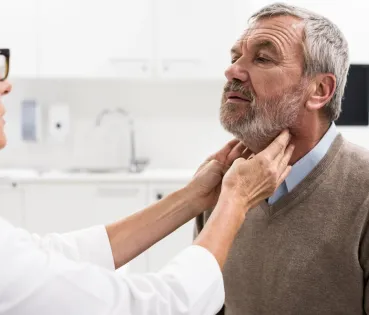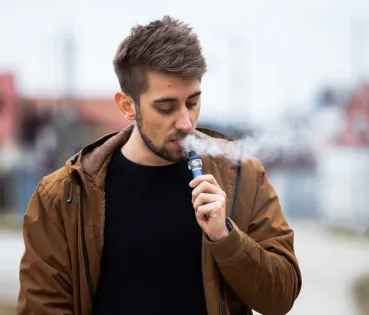
Losing your sense of smell: causes and how to get it back
Covid-19 infection has caused many patients to lose their sense of smell. And this in turn, has provoked many questions. We talked to Doctor Pablo Marcelo Reyes Burneo, from the Otolaryngology/Head and Neck Surgery Service at the Hospital Universitario HLA Moncloa; and to Doctor Rafael Vera Llaó, Head of the Otolaryngology Service at the Parc Sanitari Sant Joan de Déu, an Assistència Sanitària doctor, who works with the Hospital de Barcelona, to seek out the answers.
The loss of the sense of smell is considered as one of the clear symptoms of Covid-19, and today, for many it is one of the earliest indicators to detect the infection. Different international studies, such as the one presented at Science Advances by the Harvard Medicine School, suggested that its appearance predicts the disease better than the other symptoms, such as a cough or a temperature. Many patients lose their sense of smell and suffer alterations, but the good news is that in time, most people get it back. Why does it happen? Is there any way to prevent it? Are there different degrees of loss? How does losing such an important sense affect people psychologically? Are the therapies used to recover the sense of smell effective?
The causes
“Outside this pandemic, where there is a link with SARSCoV2, the most usual causes are inflammatory ailments in the nasal mucosa, such as for example, acute or chronic rhinitis or rhinosinusitis. Other less frequent causes are tumour lesions, bumps or traumatisms that can affect the elements at any point of the olfactory paths,” Doctor Pablo Marcelo Reyes Burneo explains.
The relation to Covid-19
The alteration caused by the infection is shown by the percentage of patients affected, but the answers are not clear. “The exact pathogenesis of this alteration has not been sufficiently defined. The hypothesis is that it is because of the damage caused in the olfactory channels, due to the destruction of the olfactory epithelium (sensorineural damage or neurodegenerative damage). One idea involves an injury in the no-neuronal cells that express ACE2 receptors such as the epithelium support cells, Bowman’s glandular cells and horizontal basal cells. The SARS-CoV2 coronavirus would have a tendency and facility to join with these ACE2 receptors,” Doctor Rafael Vera Llaó points out. What is clear is that in the case of SARS-Cov2, this particularity coincides. “The cells of the olfactory nerves at nasal level have a large amount of receptors of the angiotensin 2 converter enzyme; and in turn it is easier for the virus to penetrate the cells that have this receptor, causing inflammation and injuries in the neurons in charge of the sense of smell,” Reyes indicates.
Different degrees
Pero perder el olfato no significa lo mismo para todos los pacientes. Algunos no huelen nada (anosmia), otros muy poco (hiposmia), algunos perciben olores que nada tienen que ver con la realidad (parosmia), otros reciben siempre olores desagradables (cacosmia)… “Las alucinaciones no pueden ser explicadas al cien por cien. Una posible causa es que cuando un nervio se regenera, para curarse o madurar, en ocasiones se forman vías imperfectas que pueden dar como resultado estos olores alterados. Es comparable a cuando una persona, por ejemplo, sufre una parálisis facial idiopática (en general causadas por otros tipos de virus) y durante la recuperación de la movilidad muchas veces tienen tics o pequeñas contracciones involuntarias en relación con este proceso de recuperación”, explica Reyes, quien durante los últimos meses ha visto todo tipo de casos en el Hospital Universitario HLA Moncloa.
The recovery
Some of the ailments can be completely reversible, partially reversible or they may be permanent. In the cases with Covid-19, the final answer will require a longer analysis time, because there are patients who recover their sense of smell in a few weeks and there are others who are still unable to smell anything. Doctor Reyes adds that “smell is a highly complex sense that has neuronal connections with other areas of the brain, such as the limbic system related to emotions and with other areas that also are related to the memory, for example.”
The waiting time
“There is no exact time. In the case of there being no inflammatory cause for it (rhinitis, rhinosinusitis), but rather idiopathic or viral causes, a period of 12 months is considered to be sufficient to recover the sense of smell, at least partially,” Reyes explains. “It would be very complicated for a patient who has not recovered their sense of smell after a year to get it back,” Doctor Vera adds.
The psychological impact
Suddenly not being able to smell and even accepting a partial loss of the sense of smell also involves an important emotional impact that is explained by different factors. “The sense of smell is closely linked to the limbic system, to the memory and to the emotions. A smell can bring back a memory or can take us equally to experience different moods,” Doctor Reyes indicates.
How it works
“Smell works through a group of nerves that cross a frontal area at the base of the skull called the cribiform plate, which basically is a very thin plate with some very small holes in it for the nerves to pass through from the brain region towards the nose, where finally (through some very long fibres called olfactory hairs) smells are captured. These fibres are not loose inside the nose, but attached to the nasal mucosa. Therefore, any inflammation that affects the nasal mucosa, excess mucous, means that these fibres are less exposed to the smells and therefore the sense of smell is altered,” Doctor Reyes explains in a simplified way.
Smell or taste…?
We must distinguish between taste and smell and know that, at times, we perceive elements that we attribute to taste when really, they belong to smell. “Taste is a more primary sense that allows us to distinguish between the 5 basic flavours: sour, sweet, salty, bitter and savoury. On the other hand, through aftertaste, smell allows us to differentiate between all the different nuances: sweet-chocolate; sweet-orange; salty-biscuit; amongst others. Professional tasters of wine, coffee or tea, have a super sense of smell rather than a super sense of taste,” clarifies the doctor from the Hospital Universitario HLA Moncloa.
Training your sense of smell
There is a method to train and recover the sense of smell. “Although there is no proof that it is very effective, when a patient loses all or part of the sense of smell, this therapy may be recommended. The idea is to evoke olfactory memories previously present in the patient. They are exercises aimed at recovery the perception of smells and it consists of inhaling smells concentrating the mind, at least, twice a day. These are brief inhalations of approximately 30 seconds and four flasks with basic, specific and different smells are used, such as chocolate, rose, lemon, coffee, clove, eucalyptus…, Doctor Rafael Vera states.
This type of therapy, as explained by Doctor Pablo Mercelo Reyes, “is based on trying to use the olfactory
connections to the areas of memory and trying, through the activation of a memory, to make the sense of smell become reactivated and manage to recognise this smell. Once the basic smells have been identified, the patient moves on to four different ones. It is a therapy that requires patience, time and constancy. And in most cases, at least 3 months are needed for the first four smells. Once these have been achieved, the therapy usually goes faster.”
The results are varied and the efficiency of the therapy has not been proven, but it is recommended. “It requires great constancy and patience. These are methods that have been shown to be effective in some patients and they have advantages: they are not harmful, damaging or expensive and the results can be measured,” Doctor Reyes concludes.






